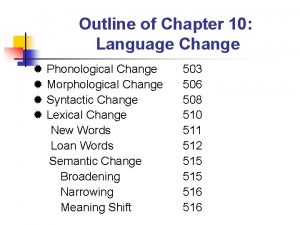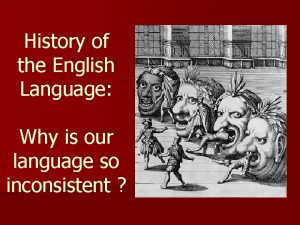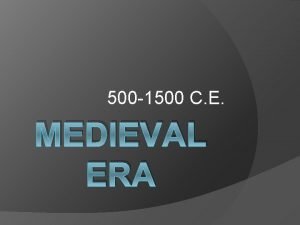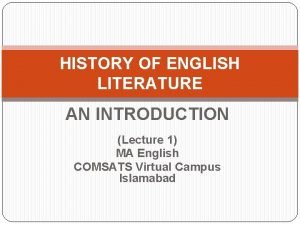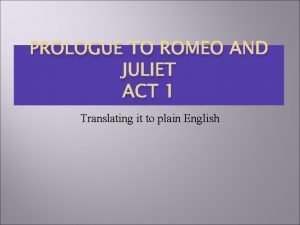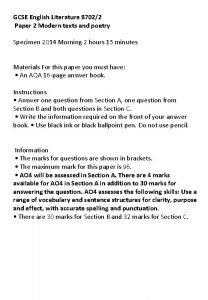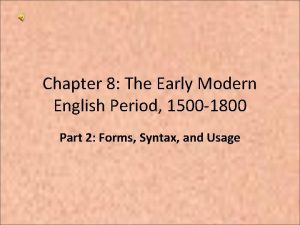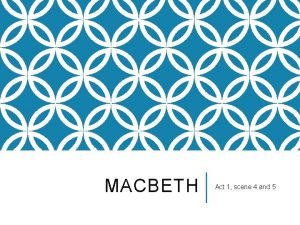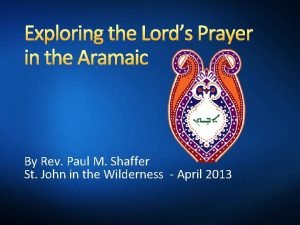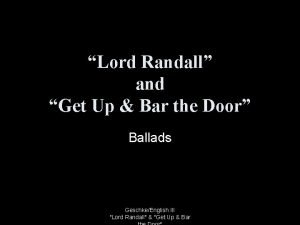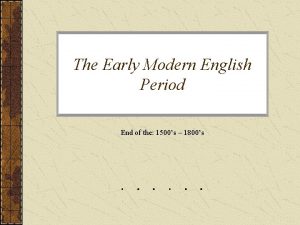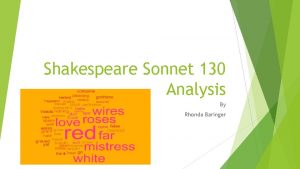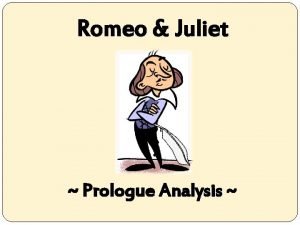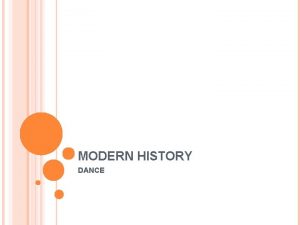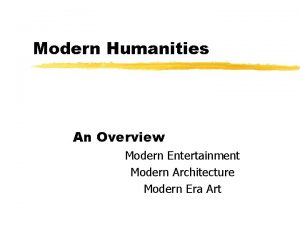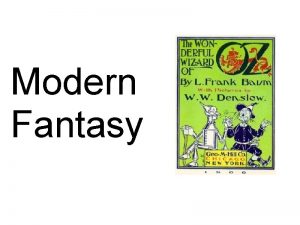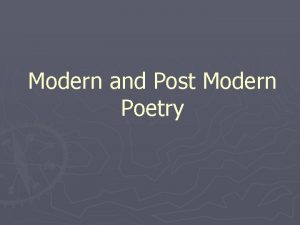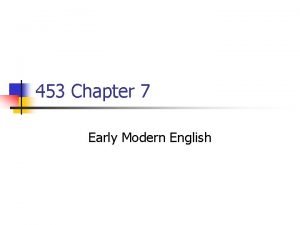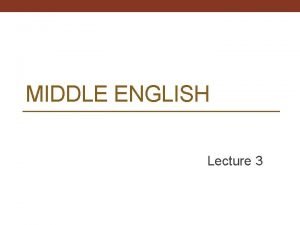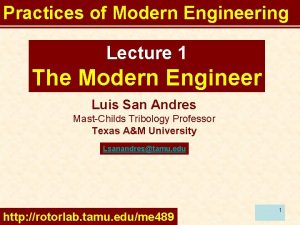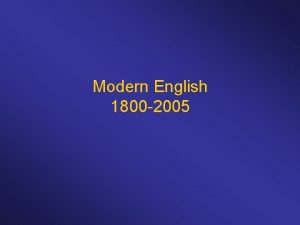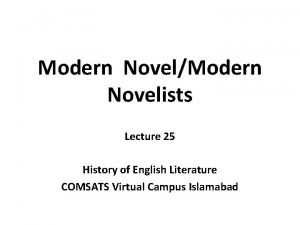Modern English Lecture 4 Modern English 4 1



![Early Mod. E Phonetic System The letter A shifted [a] >[æ] & later [æ] Early Mod. E Phonetic System The letter A shifted [a] >[æ] & later [æ]](https://slidetodoc.com/presentation_image/4d92e79c5e3a9a3b15eff3aa4235c83d/image-4.jpg)

![Early Mod. E Phonetic System Some changes in consonant pronunciation: • [h] was lost Early Mod. E Phonetic System Some changes in consonant pronunciation: • [h] was lost](https://slidetodoc.com/presentation_image/4d92e79c5e3a9a3b15eff3aa4235c83d/image-6.jpg)














- Slides: 20

Modern English Lecture 4

Modern English 4. 1. Early Modern English: General Background 4. 2. The Early Modern English Phonetic System 4. 3. The Early Modern English Grammar 4. 4. The Early Modern English Vocabulary 4. 5. The Early Modern English Literature 4. 6. The Late Modern English: Brief Outline

Early Mod. E: General Background • • from 1475 till 1660 The National English language was formed. Before English existed in forms of different dialects. The London dialect was used as the basis for the formation of the National English language. • In the 16 th c. the first grammars appeared; they described the elements of the language and defined the strict rules to be followed. • Until the 17 th c. English was spoken only in Britain. • English began to spread all over the world (Great Geographical discoveries and the establishment of colonies).
![Early Mod E Phonetic System The letter A shifted a æ later æ Early Mod. E Phonetic System The letter A shifted [a] >[æ] & later [æ]](https://slidetodoc.com/presentation_image/4d92e79c5e3a9a3b15eff3aa4235c83d/image-4.jpg)
Early Mod. E Phonetic System The letter A shifted [a] >[æ] & later [æ] > [a] before r: harm, hard • also [æ] > [a] before voiceless fricatives: staff, class, path; • [a] before l became [o]: all, walk; also after w: want, wash; but not if the vowel preceded a velar consonant: wag, quack. The letter U shifted [u] > [ʌ]: run, mud, gull, cut, hum, cup; but not if preceded by labial and followed by l or palatal s: bull, bush. The letter R tended to lower vowels when following them: fer > far, sterre > star, derk > dark, ferme > farm. A new sound [ə: ] appeared: some vowels before r: ir (first), ur (turn). Some long vowels were shortened: • [ɛ: ] before [d], [t], [θ] >[e], e. g. breed > bread [brɛ: d] > [bred]; • [u: ] before [v], [d], [ð] changed into [u], e. g. glove [glu: ve] > [gluv] > [glʌv]; • [u: ] before [k] turned into [u], e. g. book [bu: k] > [buk].

Early Mod. E Phonetic System The Great Vowel Shift was a global change in the pronunciation of English (the 14 th c. – the 16 th c. ). It consisted in the narrowing of all Middle English long vowels, and diphongisation of the narrowest long ones. • ME [i: ] > Mod. E [ai] time [ti: me] > [taim] • ME [e: ] > Mod. E [i: ] keep [ke: p] > [ki: p] • ME [ɛ: ] > Mod. E [e: ] > [i: ] sea [sɛ: ] > [se: ] > [si: ] • ME [a: ] > Mod. E [ei] name [na: mə] > [neim] • ME open [ɔ: ] > Mod. E [ou]go [gɔ: ] > [gou] • ME close [o: ] > Mod. E [u: ] moon [mo: n] > [mu: n] • ME [u: ] > Mod. E [au] out [u: t] > [aut] The Great Vowel Shift did not affect spelling as it occurred when the spelling was already fixed.
![Early Mod E Phonetic System Some changes in consonant pronunciation h was lost Early Mod. E Phonetic System Some changes in consonant pronunciation: • [h] was lost](https://slidetodoc.com/presentation_image/4d92e79c5e3a9a3b15eff3aa4235c83d/image-6.jpg)
Early Mod. E Phonetic System Some changes in consonant pronunciation: • [h] was lost and the preceding short vowel became longer, e. g. light [liht] > [li: t]. • The palatal semivowel [j] followed [s], [z], [t], [d], the sounds merged to produce a palatal fricative or affricate: pressure, seizure, creature, soldier. • Some consonant combinations were simplified: [mb] > [m] lamb [lamb] > [læm]; [kn] > [n] knee [kne: ] > [ni: ]; [hw] > [w] when [hwen] > [wen]; • /r/ was often lost before consonants or in final position: part, brother, etc.

The Early Mod. E Grammar This period is characterised by a further loss of inflections and the growth of prepositions and auxiliaries. Nouns witnessed further unification: most of them had the same plural ending -es. There remained some irregular plurals (men, teeth, feet, lice etc. ), a few -n plurals (shoes/shoon, eyen, kine ‘cows’ etc. ), some unmarked plurals (deer, swine, folk etc. ). There appeared a N+N combination (unmarked genitives): mother tongue, lady slipper, ladybird etc. Adjectives continued to form degrees of comparison with -er and –est; analytic forms were also productive. Comparatives and superlatives were often formed by combination of more / most with -er / -est (the so-called double comparison), e. g. the most worst.

The Early Mod. E Grammar Pronouns: • The 2 nd person singular forms thou and thee disappeared in the 17 th century, and the plural forms (ye/you) prevailed for both singular and plural. • There appeared possessive its, which was sometimes spelt it’s. • Separate conjoint and absolute forms of possessive pronouns appeared (my/mine etc. ).

The Early Mod. E Grammar • The verbal endings underwent further changes, for example, the 2 nd person singular -st ending was lost. • The 3 rd person singular verbal ending -s was often used instead of -th during the Early Mod. E period. More strong verbs were becoming weak, e. g. help. • The system of Perfect forms, which had arisen in OE and developed in ME, went on unfolding. The category of Continuous aspect, which arose in Middle English, was developed only in the Mod. E period.

The Early Mod. E Grammar • The transformation of English into an analytic language • It led to a fixed word order and the introduction of grammatical words (mainly auxiliaries that could be used in the contracted form). • The word order was rather similar to that of Mod. E. • In Early Mod. E negation was not normally expressed by one or two negatives, which were typically alone in a clause, however, there a few cases where single negation was expressed using multiple negative words: Nor go neither. But you’ll lie like dogs, and yet say nothing neither (Or walk either. You’ll just lie there like sleeping dogs and say nothing). • The introduction of syntactic punctuation in the 17 th c.

The Early Mod. E Vocabulary Word-formation: affixation, compounding, and conversion. • Affixation: used to form nouns, adjectives, several adverbs and just a few verbs. The most productive noun suffixes were –ness, -er. Adjective + –ness = noun, e. g. , wittiness, briskness, Verb + -er = noun, e. g. , feeler, mercer. Suffixes for verbs: -en, -ize, -ify, e. g. , facilitate, brighten; Suffix for adverbs -ly, e. g. , bawdily. Suffixes for adjectives: -ed, -ful, -less, -able, -ic(al), -ing, ive, -y etc. , e. g. , persistive, dirty. • The most productive prefixes: un- , mis- , re- , dis- , de- etc. for verbs; un- , in- , dis- etc. for adjectives; pre-, ante- , counter- etc. for nouns.

The Early Mod. E Vocabulary • A number of nouns in Early Modern English were formed by compounding, e. g. , horse mill, wood beetle, latten kettle etc. • Early Modern English verbs were often produced from nouns and adjectives by means of conversion, e. g. , skin, dirty, lump etc.

The Early Mod. E Vocabulary Borrowing • Early Mod. E is characterised by a large number of borrowings from Classical languages (Latin and Greek), (the growing interest in the writings of antiquity). • Until the 16 th c. Latin was the international language for scholarly work. Thus, Latin borrowings of the period include species, radius, specimen, apparatus, focus, ability, dedicate, scientific etc. Greek borrowings are: anonymous, catastrophe, criterion, democracy etc.

The Early Mod. E Vocabulary • French continued to affect the vocabulary of English (essay, menu, etiquette, amateur etc. ). • Italian provided many music terms (violin, duo, allegro, opera etc. ) and such words as grotto, granite, balcony etc. • The Early Modern period was the beginning of the Great Geographical Discoveries era, which resulted in the increase in contacts with other counties and a number of borrowings from different languages (Spanish, Dutch and others). The English language was brought to the African, American and Australian colonies, thus marking a new era of English outside England.

The Early Mod. E Literature • The importance of learning and language studies was understood by many Europeans and the British in particular. This resulted in the appearance of the early dictionaries of English such as the dictionary by Robert Cawdrey in 1604 (120 pages, 3, 000 words). • The significant translation of the Bible made during the reign of James I (1603 – 1625). The translation also known as the King James Bible was done by a group of clerics in 1604 – 1611. • Another major religious work of the period is Book of Common Prayer compiled by Thomas Cranmer, a Protestant reformer from the Tudor period, which first published in 1549.

The Early Mod. E Literature • William Shakespeare (late 16 th – 17 th c. ) is considered the greatest author of England. Shakespeare wrote poems and plays: comedies, histories and tragedies. • His comedies include A Midsummer Night’s Dream, The Merry Wives of Windsor, All’s Well That Ends Well, etc; • His history plays are Henry V and Richard III etc. • The most famous among his tragedies are Hamlet, Othello, Macbeth, Romeo and Juliet, and King Lear. • The other important figures of the period are Christopher Marlowe, Ben Jonson, John Fletcher and Francis Beaumont.

The Late Mod. E: Brief Outline • After 1700, there were fewer linguistic changes in the English language than in the previous periods. • One of the key changes is the expansion of the lexicon as a result of colonialism and social and political changes (Industrial Revolution, technological and medical advances etc. ). • A number of encyclopedias, scientific works, grammars, and dictionaries were produced: in the 17 th c. 34 grammars were created in Britain. Some of the most important works in the 18 th c. : - the dictionary by Nathan Bailey (1721) - the dictionary by Samuel Johnson (1755).

The Late Mod. E: Brief Outline • At the beginning of the 18 th c. , the spelling was relatively stable, though there were various attempts at spelling reform. Today, spelling is relatively standardised. • Correct pronunciation became a major concern in the Modern English period. To this day, the pronunciation varies greatly from region to region. • The tendency towards an analytic language continues in Modern English. The word order of Modern English is primarily SVO, with a special order for questions. • Multiple changes in the social and political life occurred during Modern English. In most cases it led to the introduction of many new words, such as colonist, idealist, phonography, civilization, metallurgy, pyjamas, hysteria, phobia, locomotive etc.

The Late Mod. E: Brief Outline An immense increase in vocabulary in several fields is witnessed in the 19 th, the 20 th and the 21 st century. • medical terms: radiotherapy, AIDS, aspirin, insulin, hormones. • scientific terms: biochemical, DNA, relativity theory, radiation, atom bomb; • psychological terms: psychotherapy, shock therapy; • communication: TV, radio, computer, Internet, commercial; • transport terms: helicopter, train, automobile, shuttle, airplane; • military terms: gun, tank, agent orange; • art/music terms: impressionist, rap, hip-hop; • political terms: emancipation, human rights, Cold War. The vocabulary is enriched through borrowing from other languages (polo, pasta, broccoli); by compounding (acid rain, junkfood); by affixation (postmodern, counterrevolution); by conversion (to fax, play -off, to empty) and so on.

Thank you
 01:640:244 lecture notes - lecture 15: plat, idah, farad
01:640:244 lecture notes - lecture 15: plat, idah, farad Language change
Language change Old english vs modern english
Old english vs modern english Old english vs modern english
Old english vs modern english English literature lecture
English literature lecture English language lecture
English language lecture Thou/thee in modern english
Thou/thee in modern english Shakespeare shall i compare thee
Shakespeare shall i compare thee Two houses romeo and juliet
Two houses romeo and juliet English literature paper 2
English literature paper 2 Early modern english syntax
Early modern english syntax Early modern english
Early modern english Aitchison labelling packaging network building
Aitchison labelling packaging network building Macbeth act 1 scene 1 and 2 activites
Macbeth act 1 scene 1 and 2 activites Lords prayer aramaic
Lords prayer aramaic Modern english lexicology
Modern english lexicology Get up and bar the door
Get up and bar the door Macbeth act 1 scene 7 modern english
Macbeth act 1 scene 7 modern english Early modern english period
Early modern english period Shakespeare sonnet 130 paraphrase
Shakespeare sonnet 130 paraphrase Romeo and juliet prologue imagery
Romeo and juliet prologue imagery

